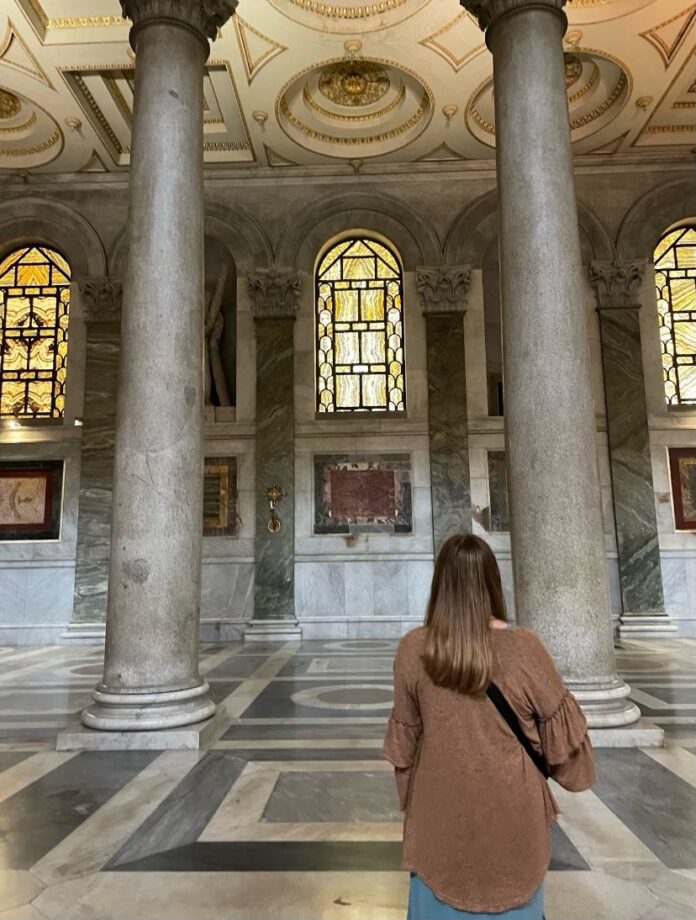
Memory and hope in the present academic year
The hope and energy bubbling across the Mall on the first day of the new academic year was a special delight after being away from Irving last semester. In this “there and back again” period following my Rome semester, I find myself continually reflecting on one of my final memories in Rome.
Four months ago, a semester-long pilgrimage that began at the tomb of St. Peter culminated before the body of St. Paul. These co-patrons of the University of Dallas Due Santi campus in Rome also served as the bookends of my unforgettable semester. Two friends stood beside me as I read aloud one of my favorite Scripture passages, Philippians 3:7-16.
Within this passage Paul declares, “Forgetting what lies behind but straining forward to what lies ahead, I continue my pursuit toward the goal, the prize of God’s upward calling, in Christ Jesus.”
There, in one of my final moments in the Eternal City, I was puzzled by Paul’s encouragement to “Forge[t] what lies behind.” I didn’t want to forget that transformative semester! I didn’t think that Paul wanted me to forget either. What is the art of forgetting to which St. Paul urges us?
Memory is one of the most visceral themes of the human experience. As a narrative animal, man’s memory shapes his understanding of himself, interpreting and grasping for a comprehension of the way past moments thread together towards the present.
Paul’s Jewish heritage teaches him of the sacredness of memory and that remembering God’s past salvific deeds is a critical act of worship. And yet this greatest of apostles urges us to forget, to keep straining forward.
Forgetting comes easily for me during a biology exam, but the Pauline art of forgetting the past without forsaking it is a task that requires considerable effort and resilience.
As a liberal arts university, we delight in this tension between remembering the good and straining towards an uncharted future. We find ourselves battling within the ancient pages of Homer but we also uncover our humanity in the modern intricacies of poets like Marianne Moore.
Aquinas offers us an undimmed vision of hope, not so that we can pine for the Middle Ages, but so that we can experience God’s overwhelming goodness in the present age and rejoice that no matter what takes place in coming decades, “This is part of the infinite goodness of God, that He should allow evil to exist and out of it produce good.”
In our personal lives, it can be so easy to cling to the past, whether that past is a tender experience that we want to remain unending or a shattering moment that we regret and still angrily relive.
Paul does not tell us to reset our memories and discard this precious facet of our humanity. Christ affirms the goodness of the memory when the words of absolution do not heal the soul through spiritual amnesia. The memory of our sin leads us to greater praise of the Lord’s mercy. Likewise, those most beautiful, timeless memories foreshadow the beauty to come.
But we are supposed to recognize that, like the Apostles on Mount Tabor, we cannot stay in those sacred moments forever. Our eternal vocation is not fully accomplished in this world. To get home, we must keep going, leaving each moment for the next, all the while hearing Christ’s voice, “Rise up and do not be afraid.”
Paul would not disagree with Willa Cather when, at the close of “My Antonia,” she writes of the power of “the precious, the incommunicable past.” Yet Paul’s confidence in Christ enables him to see that a far more precious and incommunicable treasure lies in the present moment, and that treasure is grace.
Here and now, this present academic year serves as a tabernacle where the Holy Spirit dwells to convict and entrance our souls like never before. Whatever beauty and struggle we might have possessed in the past, Christ offers us the grace and courage to experience our poverty in the present moment. In doing so, we receive His radical freedom with empty and open palms.
If we live this academic year in awe of the piercing goodness of each moment, we will be one year closer to “the end of all our exploring,” as T.S. Eliot writes, when we behold our goal and prize, to be face to face with Jesus Christ.
